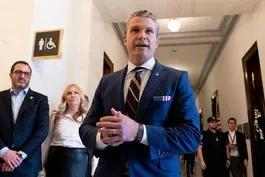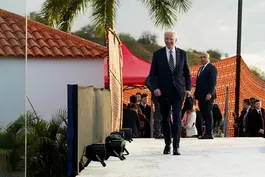
Federal Reserve official on latest efforts to tame inflation
Clip: 12/4/2024 | 7m 21sVideo has Closed Captions
Federal Reserve Bank of San Francisco president on latest efforts to tame inflation
The Federal Reserve may cut interest rates later this month as officials weigh inflation and the broader economy. Inflation has been running above the Fed’s targeted rate and other economic indicators have remained strong, leaving some worried progress on reining in prices has stalled. Geoff Bennett discussed more with Mary Daly, president and CEO of the Federal Reserve Bank of San Francisco.
Problems with Closed Captions? Closed Captioning Feedback
Problems with Closed Captions? Closed Captioning Feedback
Major corporate funding for the PBS News Hour is provided by BDO, BNSF, Consumer Cellular, American Cruise Lines, and Raymond James. Funding for the PBS NewsHour Weekend is provided by...

Federal Reserve official on latest efforts to tame inflation
Clip: 12/4/2024 | 7m 21sVideo has Closed Captions
The Federal Reserve may cut interest rates later this month as officials weigh inflation and the broader economy. Inflation has been running above the Fed’s targeted rate and other economic indicators have remained strong, leaving some worried progress on reining in prices has stalled. Geoff Bennett discussed more with Mary Daly, president and CEO of the Federal Reserve Bank of San Francisco.
Problems with Closed Captions? Closed Captioning Feedback
How to Watch PBS News Hour
PBS News Hour is available to stream on pbs.org and the free PBS App, available on iPhone, Apple TV, Android TV, Android smartphones, Amazon Fire TV, Amazon Fire Tablet, Roku, Samsung Smart TV, and Vizio.
Providing Support for PBS.org
Learn Moreabout PBS online sponsorshipThe Federal Reserve may cut interest rates for the third straight time when it meets later this month.
That's as officials weigh the state of inflation in the broader economy.
Inflation has been running above the Fed's targeted rate recently, and other economic indicators have remained strong, leaving some worried that progress on reining in prices has stalled.
We're joined now by someone familiar with these challenges.
That's Mary Daly, president and CEO of the Federal Reserve Bank of San Francisco, who will have a vote in this month's meeting.
Welcome back to the NewsHour.
Thank you.
Glad to be here.
So the Fed chair, Jerome Powell, said today that the strength of the US economy means that the central bank can show some restraint when it comes to cutting rates.
Is that how you see it?
Well, I think we do not need to be urgent.
There is no sense of urgency, but we do need to continue to carefully calibrate our policy and make sure it's in line with the economy we have today and the one we expect to have going forward.
Do you favor a rate cut at this December meeting?
You know, I'm going to wait until I get to the December meeting and do all the analysis.
You know, I talked to a lot of my contacts on the way up to the meeting, not only looking at the published data, but also getting the real time data on the ground from people who are doing business, working in the economy, leading their communities.
And I'm going to bring that information with all of my other colleagues.
And there's 19 of us and discuss and debate what the right calibration of policy is to support both the decline in inflation, which we need to have and the health of the US economy.
Well, how do you interpret the signals that you're seeing right now from the economy?
That's a great question.
So there's really multiple signals, if you will.
You know, this is an economy where the data often look really good, but the lived experience of individuals, it is not meeting those data.
It's not I wouldn't characterize the lived experience is feeling very good.
And so we're balancing all of those things.
Ultimately, what people want is price stability, lower inflation, bringing it fully back to target and an opportunity to catch up from what inflation took from them when it was so high and wages weren't keeping up.
So there's a lot more work for us to do and balancing policies so that we deliver on that price stability, 2% inflation, and we deliver on the durable expansion that gives people that opportunity to catch up, be made whole and return to what they really want to do, which is families, communities, careers.
Yeah, it's an interesting point.
And we reported on this pretty extensively on the program last night, this disconnect between the strong economic indicators and the significant portion of Americans who say the economy isn't working for them.
And that raises the question, you know, given the delta between the two, do you think the mechanisms for measuring how the economy affects everyday Americans is adequate?
Well, I think it is, but I think it's often mischaracterized as we only look at the published data by policymakers at the Fed have really for 20 years broaden their lens and importantly, the reserve banks.
There's 12 of us across the country are most of their jobs are out in the field, so to speak, talking to our communities, businesses of all sizes, community groups, workers.
You know, I have the nine states in the western United States.
So that's all of your Intermountain states, Idaho, Nevada, Utah, Arizona, and then the coastal states and Alaska and Hawaii.
What I hear from each one of those, wherever I travel, is that inflation is still the number one challenge that people are facing and what they're hoping for and what we're trying to accomplish as the Fed is bringing inflation down, giving them back that 2% price stability and doing it in a way that supports the economy.
And because they're not done with digging out of the hole that inflation caused.
And they just want an opportunity to do that and then go back to the business of living.
Why do you think inflation has been so sticky in recent months after significant progress on that front?
You know, it's a great question and everyone's asking it.
But I ultimately, you know, the the expectation I had is inflation would be bumpy on the way down.
And it has been bumpy.
You remember the early part of this year, there was even concerns it was re accelerating.
But if you unpack inflation, you see that, you know, the the core services X housing are kind of been stickier than coming down.
But then they reversed.
We've seen this pattern before, so I expect they'll continue.
Ultimately, what we what we do at the Fed, what I do is and with my teams is we look at the fundamentals.
One of the fundamental features of the economy that drive inflation.
And the biggest one is supply and demand.
And right now, supply and demand or even better balance.
That's true in the the goods market is true in the supply in the labor market.
And that ultimately puts downward pressure on inflation.
So, you know, those are the things you have to look to to really project how inflation is because as you know, monetary policy works with lags.
If we're only looking at the last three months, we're already behind.
You know, looking ahead a bit.
Many economists think that President elect Donald Trump's policies, the sweeping.
Tariffs, the mass deportation of undocumented immigrants, that those those policies could kick start inflation.
Does the awareness of his plans, does that figure into the decision making?
Fed officials, as you as you think about how you're going to cut rates moving forward?
You know, the first thing to understand about the Fed and policy makers is we don't deal in speculation.
We deal in facts and data and evidence.
And, you know, the president elect hasn't even come into office yet.
And so it's just right to let him come into office, work with his team, propose the whole slate of policies that he has in mind, like any incoming administration, and then start to unpack and understand better the impact that we're going to have on the economy.
I think, out of due respect, it's just a lot of speculation right now.
And, you know, again, policy isn't made on speculation.
It's made on actual projections of how the economy will evolve.
And today, my focus is entirely on is inflation coming down like we would like it to when we need it to, And are we doing that in a way that supports growth in the labor market?
Donald Trump also frequently pressured and attacked the Fed and the Fed chairman during his first term.
And during an interview today, Powell acknowledged that that pressure came not only publicly on social media, but also privately.
What concerns do you have about the the pressure that the Fed could face in the second Trump term?
Well, one of the things that is really important when you're under whatever pressure is to do your work well.
And so I think returning to what we've always done and our goals are the same regardless of what administration is in place.
And we've had a history of being pressured.
But ultimately, the work we do is important to every American, and that is what matters.
So again, restoring price stability, that's got to be top of our list and doing that in a way that doesn't unnecessarily slow the economy or the labor market.
That is ultimately what Americans want.
And I feel confident if we do our work well, we're going to have good relationships with whoever we work with in in the public sector.
Mary Daly, president and CEO of the Federal Reserve Bank of San Francisco.
Thanks for being with us.
Thank you.
The bald eagle was never officially named the national bird
Video has Closed Captions
Clip: 12/4/2024 | 4m 17s | The bald eagle was never officially named the national bird. That could soon change (4m 17s)
Chinese hackers infiltrate at least 8 U.S. telecom companies
Video has Closed Captions
Clip: 12/4/2024 | 4m 13s | Chinese hackers have infiltrated at least 8 U.S. telecom companies, White House says (4m 13s)
Hegseth visits Capitol Hill to salvage defense nomination
Video has Closed Captions
Clip: 12/4/2024 | 5m 51s | Hegseth returns to Capitol Hill in latest attempt to salvage defense secretary nomination (5m 51s)
Supreme Court hears arguments in landmark trans rights case
Video has Closed Captions
Clip: 12/4/2024 | 9m 24s | Supreme Court hears arguments in most significant trans rights case to reach bench (9m 24s)
Why Biden is pushing for more U.S. investment in Africa
Video has Closed Captions
Clip: 12/4/2024 | 8m 19s | Is U.S. investment in Africa coming too late to counter China and Russia on the continent? (8m 19s)
Providing Support for PBS.org
Learn Moreabout PBS online sponsorshipSupport for PBS provided by:
Major corporate funding for the PBS News Hour is provided by BDO, BNSF, Consumer Cellular, American Cruise Lines, and Raymond James. Funding for the PBS NewsHour Weekend is provided by...
















